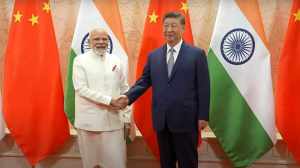Letters to the editor
The Independence Day week focused attention on the struggle for independence against the British.

The Independence Day week focused attention on the struggle for independence against the British. But even in the contentious and often repressive engagement between Britain raj and India, there were many gains for Indians as well. From Nagpur, John Alexander wrote reminding us of some of them 8216;Raj, in good part8217;, IE, August 17. His letter is this week8217;s winner.
Letter of the Week
8226; JAITHIRTH RAO8217;S piece, 8216;Requiem for the Raj8217; IE, August 15 may have touched a raw nerve in some persons who think the British Raj was an unmitigated disaster. The balance sheet, however, does indicate that there were many positive sides to the British rule. The very fact that India is one administrative unit is all due to the Raj. The introduction of the English language and work of many Orientalists need not be brushed aside. The fight for independence was launched by many people educated in England itself. The Indian identity was shaped and cobbled together by the Raj, otherwise we would still have all sorts of satraps and militias roaming the countryside, fighting perpetually to establish their short-lived dominance. The laws and the Constitution, the free press and the independent judiciary, the vast infrastructure to uphold the rule of law 8212; all this is a legacy of the British. So, even as we celebrate our 60th anniversary of independence, we need not forget the good part of the British Raj.
Brazen Congress
8226; YOUR critical editorial, 8216;Stand behind Q8217; IE, August 17 will not embarrass the UPA government led by the Congress, because the party has over the decades perfected the art of brazening it out. It operates on the pragmatic principle of 8220;Patriotism108221;, as the late Frank Moraes so admirably observed. To put it another way, what is Rs 64 crore in a budget touching ten lakh crore? Welcome as your critical editorial is, what did the Congress mean when it proclaimed that its hand is with the common man? It has used the CBI to help sustain itself in power. The present CBI director, for all his high theatrics, may well earn some stinging strictures at the hands of the apex court, and may consequently lose his job too, but then can he tell the SC that it was the law minister who was making an ass of the law. If anyone has doubts, please read B.G. Deshmukh8217;s A Cabinet Secretary Remembers, in which he tells us how the late PM very nearly named the beneficiary, but did not do so, suddenly changing his mind.
8212; Prasad Malladi, Basivireddypeta
Wanted: a new polity
8226; THE article, 8216;India Sixty: glass half full8217; IE, August 14 by Dhiraj Nayyar examines the numerous shortcomings ailing our polity. Surprisingly, however, he fails to take into account the most vital issue facing the government today and how decisions on crucial subjects are being forced. The impugned issue is of course the nuclear agreement with US 8212; an attempted gigantic step by India towards energy self-sufficiency and acknowledgement as a nuclear power. The Congress through the PM8217;s statement has in precise terms revealed its intent. But will it be able to stick to its word? The non-delivery of the political class on numerous fronts is being widely highlighted. The moment thus is opportune for the PM to lay the foundation for the transformation of politics, akin to the economic liberalisation he so successfully ushered in. If he succeeds in negotiating the agreement he would in my view redefine the role of negotiation in coalition politics. National interest is above rigid ideologies.
8212; Rav Pratap Singh, Chandigarh
- 01
- 02
- 03
- 04
- 05































